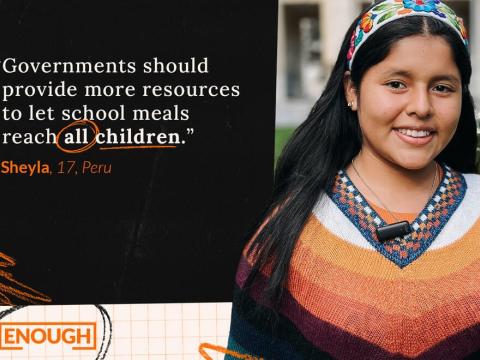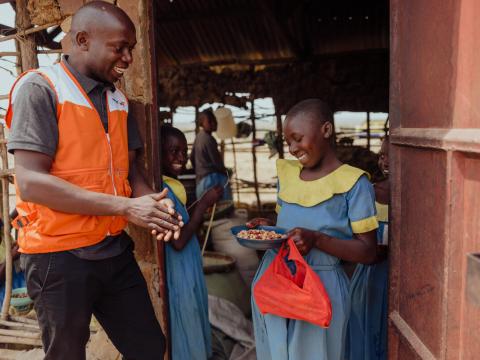
5 Things You Didn’t Know About School Meals
Cheryl Green shares five things that might surprise you about how school meals can make a difference in the lives of children and their communities
School-age children are disproportionately affected by the ongoing food crisis. With more than 733 million people facing hunger globally, at World Vision, we recognise the critical importance of school meals as a lifeline for vulnerable children.
WFP’s The State of School Feeding Worldwide report reveals that two out of five children receive school meals globally. In low-income countries the figure is even lower, with just 18% of school children receiving school meals.
School Feeding Programmes offer numerous advantages, most significantly that children receive a nutritious meal at school. This ensures that millions of children from families unable to afford adequate food are provided with a balanced meal, nourishing both their bodies and minds.
But what about the other benefits? Here are five things you probably didn’t know about the importance of school meals.
1. School Meals remove the barriers to accessing education
When struggling children are given school meals, they are more likely to attend school. Studies have shown programmes can increase enrolment by an average of 9 percent (WFP 2023).
Fifteen-year-old Faith from Kenya told us: “When you arrive at school and have not eaten at home, sometimes … you feel sleepy because of hunger. But I come to school because now at lunch time I will get food. If you stay home, there is no food.”
2. School Meals help prevent child marriage and child labour
When households face acute poverty and hunger, families face impossible choices. For some, child marriage or child labour seem like the only option to put food on the table (World Vision, 2023).
A World Vision report in 2021 found that a child who had gone to bed hungry in the past four weeks was 60% more likely to be married than his or her peers who did not experience hunger.
By encouraging children to stay in school, school meals help prevent children from being forced into child labour and keep girls safe from child marriage. One nutritious meal a day through a school meal can help children not just survive but thrive.
3. They can promote climate-resilient food production
School Feeding Programmes can also help tackle climate change and issues with global food systems. By emphasising climate-resilient and energy-smart food production, while also supporting local food markets and farmers, school meals are supporting our planet's future (WFP 2023).
4. The health benefits are more than just nutrition
When it comes to other health benefits, more than 80% of the schools surveyed for WFP’s The State of School Feeding Worldwide report also use their school meal programmes to deliver other critical health services, such as vaccinations and de-worming.
5. School Meals create jobs for the community
School meals have created four million jobs in 85 countries since 2020 - 1,377 jobs are created for every 100,000 children fed (WFP, 2023). School Meals support industries largely led by women, including cooks, small catering companies and small-holder farmers.
In conclusion, school meals serve as one of the world’s largest safety nets for vulnerable children globally. At World Vision, we believe governments must scale up access to school meals and ensure they are as ethically, sustainably and locally sourced as possible.
Among other things, we’re promoting and encouraging countries to sign up to the School Meals Coalition and supporting them in this transition and supporting governments who have committed to implementing school meals, working together to improve the quality and efficiency of existing school meal programmes.
We believe every child should have access to at least one healthy and nutritious school meal every day. Join us in saying ENOUGH sign our petition HERE.
Cheryl Green is the Social Mobilisation Advisor in World Vision International’s Advocacy & External Engagement team, working to mobilise World Vision's almost 100 fundraising and programming offices to speak with one voice and advocate for change for children. Cheryl has seven years' experience in the non profit sector specialising in advocacy and communications, and 12 years as a TV and digital journalist for UK national news organisations, including ITV News and Sky News.


